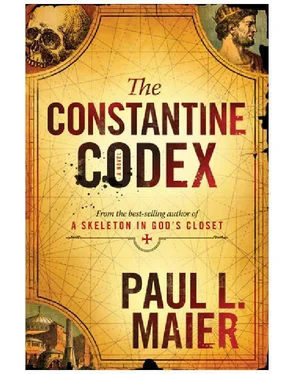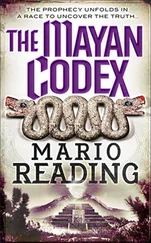Paul Maier - The Constantine Codex
Здесь есть возможность читать онлайн «Paul Maier - The Constantine Codex» весь текст электронной книги совершенно бесплатно (целиком полную версию без сокращений). В некоторых случаях можно слушать аудио, скачать через торрент в формате fb2 и присутствует краткое содержание. Жанр: Триллер, на английском языке. Описание произведения, (предисловие) а так же отзывы посетителей доступны на портале библиотеки ЛибКат.
- Название:The Constantine Codex
- Автор:
- Жанр:
- Год:неизвестен
- ISBN:нет данных
- Рейтинг книги:5 / 5. Голосов: 1
-
Избранное:Добавить в избранное
- Отзывы:
-
Ваша оценка:
- 100
- 1
- 2
- 3
- 4
- 5
The Constantine Codex: краткое содержание, описание и аннотация
Предлагаем к чтению аннотацию, описание, краткое содержание или предисловие (зависит от того, что написал сам автор книги «The Constantine Codex»). Если вы не нашли необходимую информацию о книге — напишите в комментариях, мы постараемся отыскать её.
The Constantine Codex — читать онлайн бесплатно полную книгу (весь текст) целиком
Ниже представлен текст книги, разбитый по страницам. Система сохранения места последней прочитанной страницы, позволяет с удобством читать онлайн бесплатно книгу «The Constantine Codex», без необходимости каждый раз заново искать на чём Вы остановились. Поставьте закладку, и сможете в любой момент перейти на страницу, на которой закончили чтение.
Интервал:
Закладка:
Archbishop Christodoulos II studied the list and then excused himself to show it to the general secretary of the archdiocese in another office.
Jon smiled nervously at Shannon as they waited for what seemed like an hour but was probably only a few minutes. What if they couldn’t pass even first base on their venture? Should they have done more preliminary correspondence first? Yes, they whispered to one another, they probably should have. Would have, in fact, had the translation crisis not commandeered all of their time.
Christodoulos reappeared with another document in his hand. “Please to forgive me, honored friends, for making you wait,” he explained. “Our general secretary called in several other advisers, and a debate followed. And wouldn’t you expect that of Eastern Orthodox theologians?”
“Of course,” Jon chuckled, relieved to learn what had caused the delay. He was well aware that even in the ancient church, it was the eastern half of it-the Greek-speaking East-that always loved to split theological hairs in debates that could rage on for decades, even centuries, compared to the more practical Latin church in the West that quickly came up with reasonable solutions.
Now the archbishop’s smile faded into a frown. “Unfortunately, we cannot approve your list as it now stands.”
Jon shot a glance at Shannon that said, Well, our worst fears are nicely confirmed.
“But there will be no problem,” the archbishop added, a twinkle in his eye, “if you will add a sixth condition, which we have written out. It is similar to provision five, but stronger.” He handed Jon and Shannon the second document. 6. Except in the case of heretical writings, if upon reading the ancient texts in the photographs, a word, phrase, or paragraph appears that seems in any way to contradict, threaten, or imperil the holy, ecumenical beliefs of Eastern Orthodoxy, the text or translation editor(s) must report this immediately to the offices of the archbishop of Athens rather than making that text public. Nor shall they in any way publicize this text but instead promise to keep this information absolutely confidential until it is released by the archbishop.
When Jon frowned a bit while reading, Christodoulos commented, “Please understand, dear friends, that this is not intended as censorship, but rather as a measure that will alert us to give a proper answer for such an item, should it arise.”
Jon brightened. “In that sense, we can certainly sympathize with your concerns, Your Beatitude, since worthless reinterpretations of Jesus and the church that he founded are all the rage in the print and electronic media today. Our sensationalist novelists and theologians would just love to twist some obscure line in an ancient source to discredit Christianity. We’ll gladly accept stipulation six.”
“Fine, then. We shall be happy to write your letter of introduction with the stipulations listed and send it by courier to… Where are you staying?”
“At the Grande Bretagne.”
“Excellent. It will be done.”
As they were standing to leave, Jon, in a carefully rehearsed afterthought, asked, “By the way, Your Beatitude, among the many fine textual scholars in the Church of Greece, who, in your estimation, is the foremost authority on early Greek orthography?”
“Classical Greek or koine?”
“ Koine. I should have specified that.”
“Ah, the language of the New Testament and the early church fathers. Well, this question is very easy to answer. Our outstanding authority here is Father Miltiades Papandriou at Oros Agiou.”
Jon concurred with a smile. “Had you replied with any other name, I would have asked you, ‘Why not Papandriou at Mount Athos?’”
“So then, you were only ‘testing me,’ as it were?” he asked. If Christodoulos had been frowning, it would have been a sure sign that Jon had stepped over the line. But the genial archbishop had a broad smile.
“No, it was just a case of reconfirmation. Father Miltiades is famed the world over for his ability to scan Greek lettering and slot it accurately into the nearest half century.”
“Probably the nearest quarter century or even decade!” the archbishop chuckled. “Do you plan to consult with Father Miltiades?”
Shannon quickly replied, “We’d be delighted to do that, Your Beatitude, if that were possible.”
Christodoulos shook his head sadly. “Unfortunately, Madame Weber, that is not possible. Not possible… for you,” he emphasized, then smiled. “But I can easily arrange it for your husband.”
“Oh, that’s right; do pardon my error!” she replied. “No female can enter the monastery enclave on Mount Athos!”
“Quite right, Madame Weber. Perhaps someday that will change, but that someday has not yet arrived. Shall I prepare a letter of introduction also for Father Miltiades, Professor Weber?”
“I would then be doubly grateful to you, Your Beatitude. We would also like his evaluation of a Greek text my wife found at Pella in Jordan some months ago.” The words were out before Jon quite realized what he was saying. What if the archbishop wanted to know more about that text? At least, thank God, he had not used the term manuscript.
“Kalos,” Christodoulos replied. “I shall do so and send the letter along with the other material.”
Jon breathed a sigh of relief and asked, “Do you think Father Miltiades will be amenable to my visit?”
The archbishop chuckled. “ Amenable? He will be grateful to me for sending him an internationally known scholar on the life of Christ, though he will not know he was denied a visit by this very lovely archaeologist who wished to accompany him.”
“You are very generous, Your Beatitude,” Shannon said with a shade of blush, “and we are deeply in your debt. Ef charisto.”
“ Parakalo, my friends. Parakalo.”
After a week in Athens getting approval for subsequent teams to photograph biblical manuscripts at the National Library and the University of Athens, Jon and Shannon revived the tourist aspect of their journey by renting a car and driving northward on Greece’s National Road 1 toward Thessalonica and Mount Athos. The “Holy Mountain” indeed, Athos had more monasteries per square mile than any place on earth.
While Shannon snoozed, Jon was ruminating to himself on the why of monasticism in almost every creed in the world, especially including Christianity. In the Old Testament, Elijah, Elisha, and the other great prophets each seemed to have had a desert experience-either alone or with like-minded followers. In the New, where did John the Baptist, the forerunner of Jesus, hold forth? In the wilds of Judea, of course, though near the Jordan for his baptisms. And Jesus himself? Forty days in the wilderness at the start of his ministry, the background for his famous temptation by Satan. St. Paul? Same story. Following his celebrated conversion on the Damascus Road, he spent almost the next three years in the Arabian desert, gearing up for his ministry.
The lure of the solitary tracts, the wilderness, the wastelands. And not just in Judeo-Christianity. Five centuries before the birth of Christ, an Indian prince named Siddhartha Gautama had left his wife and nine-year-old son for meditation in the forest to explore the meaning of life. And what was a forest, in terms of solitude, but a desert with many trees? He was there for seven years until he finally found the answer while sitting under the Bodhi tree and became the first “Buddha,” or “Enlightened One.” Zarathustra had had his wilderness experience as well, and the list went on and on.
Clearly, you couldn’t be a self-respecting religious luminary unless a desert experience was in your resume, Jon reflected. But why? Probably it was a case of clearer communication with God when one was in the wilds and far from the blandishments and seductions of life in the everyday world. Jon doubted that God spoke more loudly in the desert; it was just easier to hear him there.
Читать дальшеИнтервал:
Закладка:
Похожие книги на «The Constantine Codex»
Представляем Вашему вниманию похожие книги на «The Constantine Codex» списком для выбора. Мы отобрали схожую по названию и смыслу литературу в надежде предоставить читателям больше вариантов отыскать новые, интересные, ещё непрочитанные произведения.
Обсуждение, отзывы о книге «The Constantine Codex» и просто собственные мнения читателей. Оставьте ваши комментарии, напишите, что Вы думаете о произведении, его смысле или главных героях. Укажите что конкретно понравилось, а что нет, и почему Вы так считаете.












